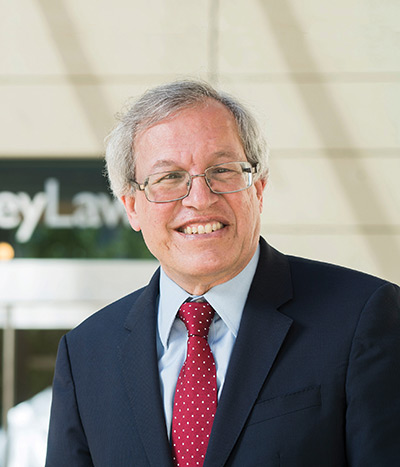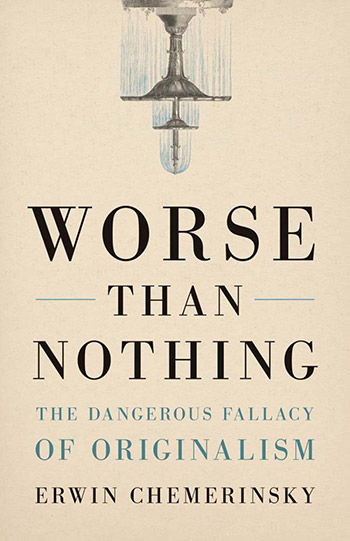By Andrew Cohen
Originalism — which calls for interpreting the Constitution in a manner consistent with how it was meant to be understood when written — was once seen as a hard-line theory adopted by a limited number of conservative legal scholars.

Today, that is hardly the case. Now an increasingly accepted approach, originalism is openly espoused by three justices on the United States Supreme Court and a growing number of judges in lower courts.
Berkeley Law Dean Erwin Chemerinsky, the nation’s most-cited constitutional law scholar, asserts that originalism is both flawed and dangerous. His new book released today, Worse Than Nothing: The Dangerous Fallacy of Originalism, provides a deep-dive historical and legal analysis which lays out various arguments for why the method is unworkable.
Chemerinsky says the original intent of a given provision frequently can’t be discerned, and that the framers never intended for constitutional interpretation to be rigid. He also states that while originalism is routinely heralded as an objective lens through which to view the Constitution, it often vanishes if the anticipated results would not mesh with conservative ideology.
Chemerinsky recently discussed his new book, his reasons for writing it, and his concerns about the future of constitutional rights.
Given your extremely busy schedule, why did you decide to write this book?
It was not that long ago, in 1987, that the Senate rejected Judge Robert Bork for a seat on the Supreme Court because his originalist views were deemed unacceptable. He said that under originalism there would no protection of privacy rights, no protection of women or gays and lesbians from discrimination, no protection of artistic expression under the First Amendment. Today, though, three justices are self-avowed originalists and all six conservative justices often write and sign on to opinions written in originalist terms. Originalism has gained a significant following among conservatives. I wrote this book to point out that originalism is a terrible and dangerous method of constitutional interpretation.
What do you see as the most troubling aspect of originalism, both from a conceptual and practical standpoint?
The world we live in is so vastly different from 1787, when the Constitution was written, or 1791, when the Bill of Rights was adopted, or 1868, when the Fourteenth Amendment was ratified.

Under originalism, Brown v. Education was wrongly decided because the same Congress that ratified the Fourteenth Amendment also voted to segregate the District of Columbia public schools and there is no indication that Congress meant to outlaw segregation. Under originalism, Loving v. Virginia, which declared unconstitutional state laws prohibiting interracial marriage, was wrongly decided because most states had such laws when the Fourteenth Amendment was ratified. Under originalism, Griswold v. Connecticut, which protected a right to purchase and use contraceptives, was wrongly decided. Under originalism, Obergefell v. Hodges, which struck down laws prohibiting same-sex marriage, was wrongly decided. Any theory that makes Brown and Loving and Griswold and Obergefell illegitimate is one that should be rejected.
With the Supreme Court’s entrenched majority now interpreting the Constitution through an originalist lens, what key rights do you think are most in jeopardy?
In June, Justice Clarence Thomas in a concurring opinion in Dobbs v. Jackson Women’s Health Organization, which overturned Roe v. Wade, said that the Court should overrule Griswold and Obegefell and Lawrence v. Texas, which held that states cannot prohibit private consensual adult same-sex sexual activity. The implications for all of our rights of a Court committed to originalism are frightening.
In overruling Roe v. Wade, the Court said that a right should be protected only if it is in the text of the Constitution or part of its history is safeguarded by a long unbroken tradition. But this puts in jeopardy numerous rights safeguarded under the liberty of the due process clause, as was the right to abortion. These include the right to marry, the right to procreate, the right to custody of one’s children, the right to keep the family together, the right of parents to control the upbringing of their children, the right to purchase and use contraceptives, the right of consenting adults to engage in private consensual same-sex sexual activity, and the right of competent adults to refuse medical care. None of these rights can be justified under an originalist approach.
What’s the main problem with trying to ascertain the Founding Fathers’ true intentions and using them exclusively to instruct court rulings?
There were so many people involved in drafting and ratifying the Constitution that there is not a “true” intent to be discovered. And even if it could be known, there is no reason why it should be binding on us today. It is a vastly different world than the agrarian slave society of 1787 when the Constitution was written.
Is the originalist approach applied consistently and objectively, or does it change based on the predicted result?
The conservatives on the Court ignore originalism when it does not serve their purpose. In 2013, the Supreme Court declared unconstitutional a crucial provision of the Voting Rights Act that required that states with a history of race discrimination in voting get pre-approval before making significant changes in their election systems. The Court said that it violated a principle of equal sovereignty that Congress must treat all states the same. But this cannot be historically justified since the Congress that ratified the Fourteenth Amendment also created military rule over Southern states.
Nor does anyone, liberal or conservative, doubt that the Supreme Court next term will overrule decades of precedents allowing colleges and universities to engage in affirmative action. The conservative justices will ignore that the Congress that ratified the Fourteenth Amendment adopted many race-conscious programs that today would be considered affirmative action.